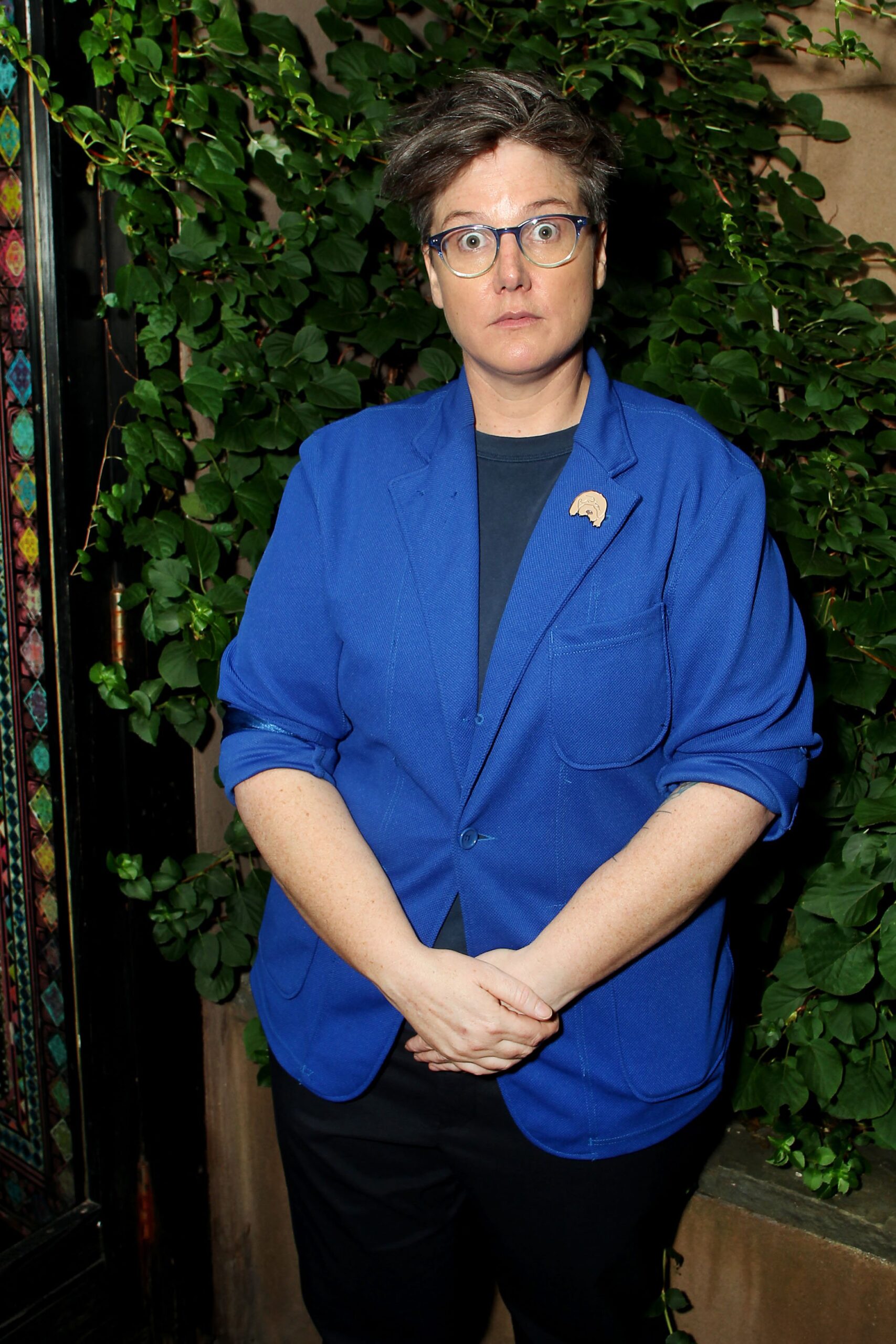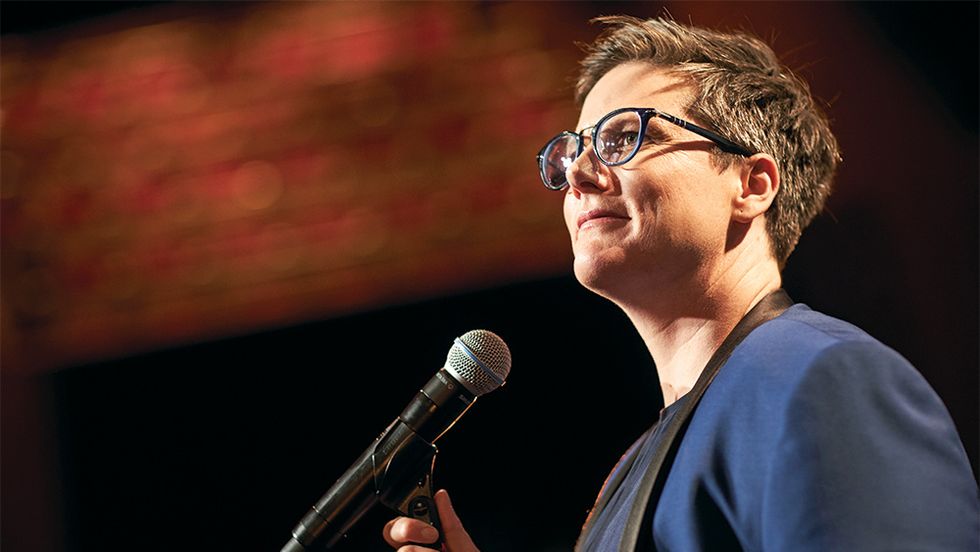
Hannah Gadsby - Comedian
Photo by Marion Curtis (StarPix for WestBeth/Shutterstock)
One year ago, we met Hannah Gadsby in her deeply introspective, game-changing Netflix comedy special Nanette.
Since then, the 41-year-old Australian has defied categorization. From prompting thoughtful critiques about the social function of comedy to living in an openly lesbian relationship while resisting labels for her gender and orientation (“I identify as tired, just tired,” she quips), Gadsby is hard to define—other than as one of the finest comedians today. But she’s better described as a comedian of the future. She’s continued to challenge and transcend the genre, with detractors arguing that her art doesn’t even constitute stand-up comedy. She shrugs off the discontent with her persistence that art is humane; it lacks boundaries between the personal and political, the tawdry and philosophical. Ultimately, she’s post-irony—not as an edgy statement, but as an individual who’s wary of the self-satire of self-effacement. Instead, she fills the performance space with intimate and earnest confessions. In a culture that grows increasingly irony-poisoned and irony-fatigued, we’re embracing a brand of emotional comedy that values earnestness over cynicism.
Hannah Gadsby: Nanette | Official Trailer [HD] | Netflixyoutu.be
Emotional comedy is the logical conclusion of a decade of cynical and ironic media that preserves our emotional barriers but ultimately strips us of genuine connection. While it’s “a widely embraced default setting for social interaction, writing, and the visual art,” Salonwrites, “irony fosters an affected nihilistic attitude that is no edgier than a syndicated episode of ‘Seinfeld.'” It’s normal to crave connection, and Gadsby does so boldly. Among the first reviews of Nanette, Slate’s Andrew Kahn wrote, “Nanette challenges an idea of comedy, humor as truth-telling, that passed as common sense until pretty recently,” he writes. “Over the past two years, that idea has come in for a bruising—if not on the stage, certainly in the public square, where buffoonish politicians, racist trolls, and abusive comedians have stoked a debate about the perils of irony. This show ought to be seen as a product of that debate: When you take the anti-irony train all the way to the end of the line, one place you can end up is ‘Nanette.'”
Nanette was critically acclaimed for Gadsby’s blending of personal anecdotes, confession, and politics. She combats our cultural reflex towards cynicism with her self-acceptance and confident rejection of societal expectations that she’s not interested in fulfilling—as a comedian, artist, queer person, rape survivor, woman who’s exercised her right to have an abortion, or person with autism. She tells her audience, “I don’t want to unite you with laughter or anger. I just need my story heard.” She reflects in a recent Variety interview, “I didn’t set out to speak about anybody else’s experience other than my own and feel incredibly humbled to think that I may have articulated an experience felt by so many others all over the world. Humbled and saddened, I guess.” Regardless, Gadsby sees her prominence as an opportunity: “I deal with the responsibility of being out and proud and even loud as much as I possibly can because there are people who need to see me. I don’t need to see me.” She added dryly, “I see me every day. But I understand the importance of being a public person who can be representative of a minority.”
I Think You Should Leave with Tim Robinson | Official Trailer [HD] | Netflixwww.youtube.com
So what’s the appeal of a 70-minute set from a comedian who runs the gamut from the overrated qualities of Game of Thrones to Christianity’s misogyny, “manspreading” as a form of colonization, and Taylor Swift? Well, of course, Gadsby is funny, extending embarrassing personal anecdotes into vivid caricatures of shame, while shooting the occasional quick-witted barb. She’s also weird. Media and art are always looking to speak against history’s focus on heteronormative, neurotypical, and politically neutral stories; but, today’s comedy particularly embraces the off-kilter and not-quite-normal, from the socially awkward sketch comedy of I Think You Should Leave with Tim Robinson (which Netflix just renewed for a second season) to the cringe comedy of HBO’s Insecure. In Gadsby’s view, “I think sometimes people find me endearingly odd, and that’s fine,” she says. “But it is troubling when you don’t know what it is.”
Despite being named as one of the most powerful people in comedy earlier this week, Gadsby’s troubles culminated in 2018 when she planned to leave comedy after over a decade of performing. Aside from struggling to accept her non-normative identities (“You know what I reckon my problem is? I don’t lesbian enough,” she quips in Nanette), she attributed her desire to quit to a pervasive feeling of irony fatigue: “I built a career out of self-deprecating humor. That’s what I’ve built my career on. And… I don’t want to do that anymore. Because do you understand what self-deprecation means when it comes from somebody who already exists in the margins? It’s not humility. It’s humiliation. I put myself down in order to speak, in order to seek permission to speak. And I simply will not do that anymore. Not to myself or anybody who identifies with me.” She adds, “And if that means that my comedy career is over, then so be it.”
Hot corner shop action – Fleabag: Episode 2 – BBC Threewww.youtube.com
Luckily, it wasn’t. Gadsby continues to lead a rising style of comedy that doesn’t just embrace oddity; it ultimately does so in order to combat shame. In regards to her critics, Gadsby toldVariety, “What I find so funny about these men getting so angry about comedy is, for starters, it’s all made up. Laughter is biological, human—and I’m not a straight white man so that culture can fuck off.” Gadsby surmises that her popularity is due to her frank voice about traditionally silent experiences, from identifying as queer in the conservative society of Tasmania to having autism. “I think what I have, and it’s something I’ve had to work really hard at, is an absence of shame,” she says. “That feels more important to me than an active position of pride.”
Gadsby represents a kind of emotional comedy that we as a society weren’t ready for even 10 years ago. After all, earnest sharing-and-caring is taxing to sit through; it’s harder to satisfy an audience when art takes emotional labor. But today, rather than the edge lord obscenity of the 80s and 90s and the slapstick parodies of the early 2000s, popular comedies are repackaging the heartfelt messages of the after-school sitcom with embarrassing self-awareness. Fleabag’s emotional depths are mined by awkwardness and heart-wrenching dialogue. Pen 15 has been called “grossly uncomfortable” but with “fine sensitivity” to middle school angst. One of Netflix’s genre-defining standouts, the coming-of-age animated series Big Mouth, employs truth-telling and cringe humor to create starkly relatable and surprisingly poignant stories of adolescence. As Collider points out, the comedy’s success lies in its bald depictions of “generations’ worth of shame, guilt, perversion, confusion, rocky relationships and dating disasters to deliver an absolutely bonkers portrayal of what it looks, feels, and even smells like to be a teenager transitioning into adulthood.” But, like Gadsby, “it also succeeds as meaningful storytelling by delivering these sex-crazed snippets in an earnest way.”
Big Mouth – Hormone Monstress First Scenewww.youtube.com
One year ago, almost to the day, Hannah Gadsby’s Nanette was “the most discussed comedy special in ages,” as covered by The New York Times. She repackaged modern comedy as a method to speak truths honestly rather than through the guise of parody or cynicism. That kind of earnest comedy is uncomfortable because it feels foreign yet innate: sometimes truths aren’t funny, but defense mechanisms don’t define a sense of humor any more than they define a whole person. Ultimately, Gadsby is an “octopi.” She says, “I used to really be guarded about my brain thoughts. But I realized that what’s interesting about me is my brain. That’s why I wear a little octopus.” She wears a pin of the animal, endeared to her for the fact that octopuses have nine brains (they also have three hearts). “I kind of feel like that with autism, because of my sensitivity to my environment,” she explains. “So I identify not only as ‘tired,’ but as ‘octopi.'”

- Hannah Gadsby’s “Nanette” is an incisive deconstruction of comedy … ›
- Hannah Gadsby on Quitting Comedy, Telling Her Story, and the … ›
- How Hannah Gadsby broke comedy | TED Blog ›
- Hannah Gadsby’s First Netflix Comedy Special Is About Why She’s … ›
- Hannah Gadsby’s ‘Nanette’: Netflix special could revolutionize stand … ›
- Hannah Gadsby is her own tough act to follow – The Boston Globe ›
- Hannah Gadsby’s “Nanette” follow-up “Douglas” is an act of self … ›
- Nanette: Hannah Gadsby’s show ‘made me feel seen’ – BBC News ›
- Watch Hannah Gadsby’s TED Talk on Having Autism and Breaking … ›
- No, No, Nanette: Hannah Gadsby, Trauma, and Comedy as … ›













